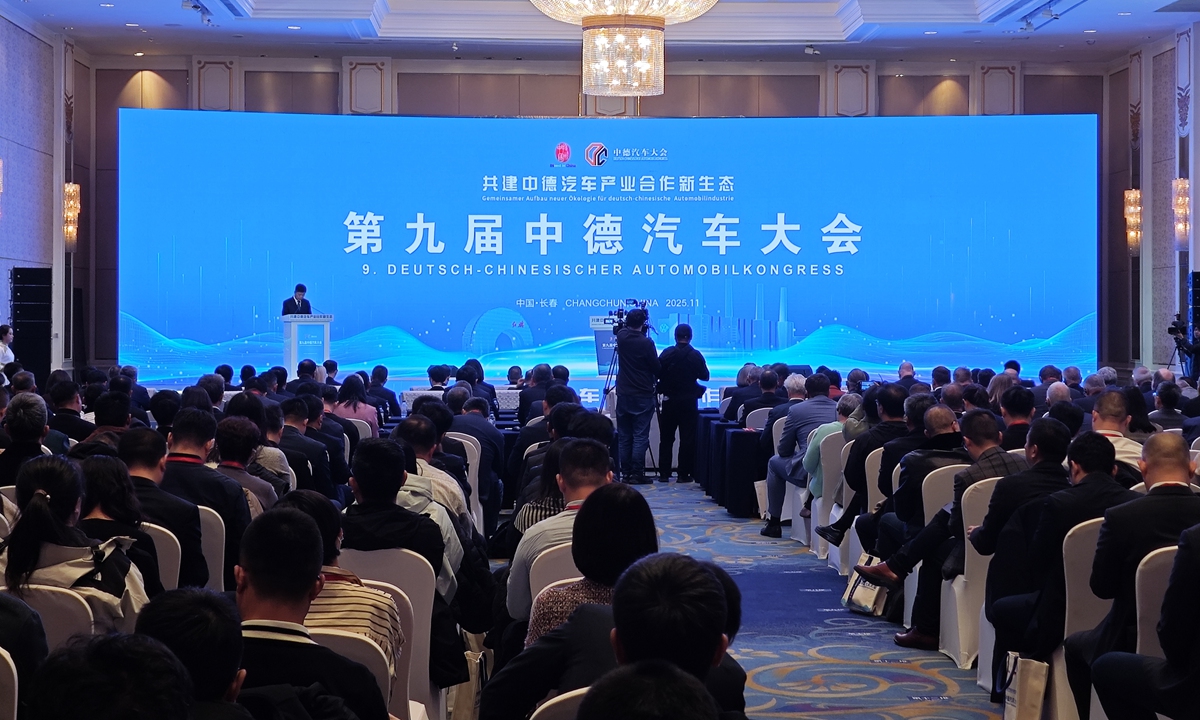China-Germany Automotive Conference kicks off in Northeast China's Changchun as German businesses embrace cooperation, oppose protectionism

The 9th China-Germany Automotive Conference is held in Changchun, Northeast China's Jilin Province on November 12, 2025. Photo: Yin Yeping/GT
German business leaders and industry representatives have called for deeper cooperation with China's automotive industry to achieve mutually beneficial outcomes, highlighting China's rapid technological progress, which German carmakers can cooperate and learn from. They also voiced opposition to unilateralism and protectionist measures, which have been on the rise globally.
The remarks came during the 9th China-Germany Automotive Conference in Changchun, Northeast China's Jilin Province, a production hub, where participants from both countries highlighted the importance of joint innovation and technology exchange.
As an annual event co-initiated by the investment promotion bureau of China's Ministry of Commerce and German vehicle industry clusters, the conference has long served as a window for cooperation, particularly for German carmakers looking to tap into the potential of the Chinese market.
More than 60 major representatives from the vehicle industry, from German conglomerates such as Volkswagen to some innovative small enterprises, participated in the event, according to the event organizer.
Commenting on the significance of taking part in this conference, Hans-Peter Friedrich, former vice-president of the German Bundestag and chairman of the Germany-China Parliamentary Group, told the Global Times that "it's a very important conference because the automotive industry in Germany and China is crucial for the economy in both countries—for jobs, growth, and wealth…This sector demonstrates that cooperation between China and Germany can be very fruitful and successful, bringing many advantages to both sides."
On a further note, Friedrich said that China is leading in global development and battery technology while Germany is strong in integrating software into hardware and systems. "Cooperation in both areas—electrification and digitalization—could be highly complementary and very successful," Friedrich said.
Also at Wednesday's conference, Jochem Heizmann, former CEO of Volkswagen China, said in a group media interview that "German companies can learn a lot here in China."
Heizmann gave an example from China, noting that there are advanced technologies in areas such as plug-in hybrids that offer a very good real-world driving range and are built on electric platforms rather than combustion engine platforms. He said that this technology gives consumers great flexibility to drive fully electric vehicles in the city while also covering longer distances, and it is something the German vehicle industry can learn from China.
The Chinese government is actively fostering cooperation between China's vehicle industry and international partners, including German companies, by building platforms to support such collaboration, Ron Zheng, senior partner at Roland Berger and vice-president of Roland Berger China, told the Global Times on Wednesday, noting that the China-Germany Automotive Conference is a clear example of this effort, sending a strong signal of China's continued commitment to openness and global collaboration.
To Zheng, China-Germany vehicle cooperation is entering a new phase characterized by a more diversified and evolving ecosystem. "In the past, our cooperation mainly followed a pattern where China provided the market while German companies offered products or technology — whether in components or vehicle manufacturing. Now, with deepening collaboration in intelligent and new-energy vehicles, some Chinese companies have reached a level on par with their German counterparts in terms of product strength, R&D capability, and supply chain depth," Zheng said, noting that this has opened up greater space and possibilities for cooperation, making the partnership more diverse and dynamic.
To Alexander Jess, managing director of the Association of International Motor Vehicle Manufacturers based in Germany, cooperation between the two countries' vehicle industries is advancing quickly.
"We are in very advanced phases of German-Chinese automobile cooperation," Jess told the Global Times at the conference, noting that "for some years now, we have entered a new phase in which Chinese manufacturers produce such fantastic vehicles that they can export them to the German market. I'm very happy to represent Chinese companies, among others, in Germany to ensure that they succeed in the German market."
His remarks did not come out of the blue, since statistics show the growing popularity of China-made vehicles globally. A report released by AlixPartners in April noted that China's exports soared 23 percent year-on-year in 2024 to 6.4 million passenger vehicles, more than 50 percent above second-ranked Japan. The report predicted that Chinese brands will account for 30 percent of the global automotive market by 2030, up from 21 percent in 2024 with big gains in emerging markets.
Amid the global rise of protectionism and unilateralism, including the European Commission's anti-subsidy tariffs on Chinese electric vehicles, German industry representatives called for collaboration over confrontation.
"There can't be and shouldn't be any protectionist measures. We should have a fair and level playing field for everybody, and we do not agree with the decision by the EU (to impose additional tariffs on China's new-energy vehicles). We hope that we can have fruitful bilateral and multilateral relations," said Jess, noting that if we want electric mobility to succeed, there is a need for low-entry and low-cost models, and Chinese companies in Germany are helping with that.
Ye Shengji, deputy secretary-general of the China Association of Automobile Manufacturers, told the Global Times at the conference that over the years, China's vehicle industry has continuously undergone transformation and upgrading, especially making significant progress in the industrialization and commercialization of electrification. "China's experience and solutions are also ready to be shared with German counterparts, with the hope of jointly promoting the industry's development and upgrading," said Ye.
"At the same time, we need to overcome some unnecessary trade barriers. I believe that people from the Chinese and German car industries are actively working in this regard, moving toward shared goals," said Ye.
Photos
Related Stories
- U.S. tariffs put Japan's auto industry under strain
- Chinese commerce minister holds video talks with Germany's economy minister
- 72nd Macao Grand Prix opens as auto show attracts fans
- Chinese carmakers gaining ground in Europe, Polish industry leader says
- Chinese FM holds phone talks with German counterpart
Copyright © 2025 People's Daily Online. All Rights Reserved.









